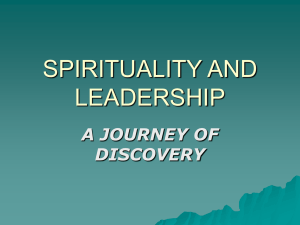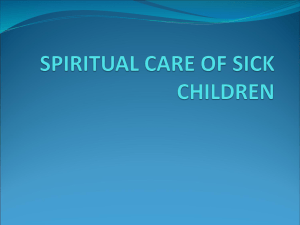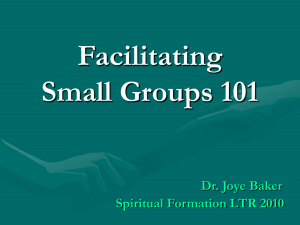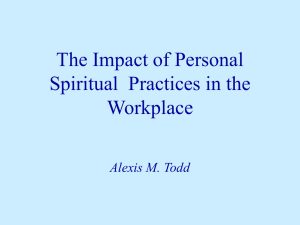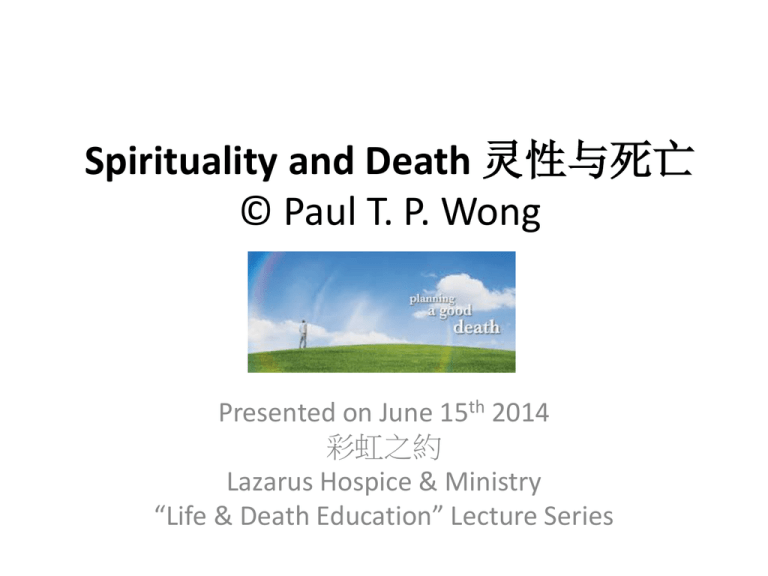
Spirituality and Death 灵性与死亡
© Paul T. P. Wong
Presented on June 15th 2014
彩虹之約
Lazarus Hospice & Ministry
“Life & Death Education” Lecture Series
Introduction
• Ten years ago, I was invited by Dr. Fung to
speak at The Consultation on Holistic
Healthcare at the Nethersole Hospital. My title
was: Compassionate and Spiritual Care in
Addressing the SARS Crisis (Wong, 2004).
• Today, I’ll re-introduce my Healing Wheel
Model of spiritual care first, before speaking
on Spiritual and Death, because this model is
also relevant to day’s topic.
A Holistic Model of Spiritual Care
整体性模式的灵性关怀
• Compassionate and Spiritual Care in addressing the SARS Crisis
• 使用爱心与灵性关怀解决SARS危机
• The inadequacy of a bio-medical cure-based medicine
• 使用生物-医学治愈的模式不能够解决问题
• Need a holistic approach that emphasizes spiritual care
• 需要强调灵性关怀的整体方法
• A whole-person approach considers patients as part of the community
• 全人模式把患者当作社区的一部分
• A healing wheel of spiritual consists of: Healer, Patient, God and the
Healing Community
• 灵性关怀的治愈之轮包括:治疗师、患者、上帝和治疗社团
The Healing Wheel
治愈之轮
Overview of Spirituality and Death
概览
• How to die with dignity 如何死得有尊严
• Need for training in caring for the terminally ill 需要照顾临
终病人的培训
• Need assessment tools for death and dying 需要评估死亡
与濒死的工具
• Five important facts regarding death and dying 死亡与濒死
有关的五个重要因素
• Five different attitudes towards death 面对死亡的五种不
同态度
• Three approaches to spirituality 灵性生活的三种方法
• Different interventions in spiritual care 灵性关怀不同方法
• Conclusion 结论
How to Die with Dignity
如何死得有尊严
• Fear of dying a slow and painful death
• 害怕慢性的、痛苦的死亡
Medical technology can prolong life but cannot adequately control
pain
• 医学技术能够延长人们的生命,但是不能有效地控制痛苦
• "Death with dignity" advocates individual's right to die
• “安乐死”运动提倡个人有权利选择死亡
• Medical community & religious groups are against assisted suicide
• 医学社区&宗教团体反对安乐死
• Need better psychological and spiritual support to improve quality
of life
• 人们需要更好的心理和灵性支持来提高生命的质量
Need training for working with the terminally ill
需要照顾临终病人的培训
• Psychological suffering of the terminally ill is common
• 临终病人通常遭受心理的痛苦
• Psychological distress can negatively affect quality of life & medical
treatment
• 心理苦恼 对生活品质&医疗处理都有不好的影响
• Intervention and spiritual care can reduces physical and psychological
suffering
• 干预和灵性关怀能够减少生理和心理痛苦
• Need for assessing dying distress
• 需要评估濒死病人的苦恼
• We can enhance the dignity and well-being of the terminally ill
• 我们能够增加临终病人的自尊感与福利
• Need more training in psychological and spiritual care for the dying
• 需要更多的关怀濒死病人的心理和灵性关怀的培训
Assessment Tools in Palliative Care
评估工具
• Death and Dying Distress Scale (DADDS; Lo et al.,
2011) 死亡与濒死苦恼量表
• Patient Dignity Inventory (PDI; Chochinov et al.,
2008) 患者的自尊度调查表
• Functional Assessment of Chronic Illness TherapySpiritual Well-Being 慢性疾病治疗的功能量表—灵
性福利
Death and Dying Distress Scale–
Sample Items
Over the past 2 weeks, how distressed did you feel about:
在过去的2周多,你有什么苦恼
Not having done all the things that I wanted to do.
没有做好所有我想要做的事情
Not having said all that I wanted to say to the people I
care about.
我没有对我关心的人,说我想说的话
Not having achieved my life goals and ambitions.
没有达到我的生活目标和抱负
Not knowing what happens near the end of life.
不知道在生命将要结束的时候,会发生什么
Death and Dying Distress Scale–
Sample Items (Cont’d)
•
•
•
•
•
•
Not having a future. 没有未来
The missed opportunities in my life.
在我的生命中,已经错过了的机会
Running out of time. 感觉没有时间了
Being a burden to others. 我是别人的负担
The impact of my death on my loved ones. 我的
死,对亲人的影响
• My own death and dying. 我自己的死亡和濒死
Patient Dignity Inventory –
Five Factors
(1) Symptom Distress (e.g., Physically distressing symptoms, Feeling depressed, Feeling anxious)
痛苦症状(例如,身体痛苦症状,感觉沮丧,感觉焦虑)
(2) Existential Distress (e.g., Feeling that I am no longer who I was, Not feeling worthwhile or valued,
Feeling life no longer has meaning or purpose)
对存在意义的苦恼(例如,不再感觉我是谁,不再感觉自己有价值或重要,不再感觉生命有意义
或目的)
(3) Dependent Distress (e.g., Not able to perform tasks of daily living, Not able to attend to bodily
functions, Reduced privacy)
苦恼于不得不依赖别人(例如,不能完成日常生活的任务,身体不能发挥正常功能,隐私减少)
(4) Lack of Peace of Mind (e.g., Feeling that I have not made meaningful contribution, Feeling of
unfinished business, Concerns regarding spiritual life)
心灵缺少平静(例如,感觉没有做出有意义的贡献,感觉没有完成工作,关心灵性生命)
(5) Lack of Social Support (e.g., Not feeling supported by friends or family, Not feeling supported by
health care providers, Not being treated with respect)
缺乏社会支持(感觉没有朋友和家人的支持,感觉不到医疗保健机构的帮助,不被尊重)
Functional Assessment of Chronic Illness TherapySpiritual Well-Being
Three Factors in Spiritual Well-Being
灵性福利三个因素:
(1) Inner Peace (e.g., I feel peaceful, I feel a sense of harmony within myself)
内心的平安(例如,我感觉平安,我自己有和谐的感觉)
(2) Faith/Spirituality (e.g., I find comfort in my faith or spiritual beliefs, My
illness has strengthened my faith or spiritual beliefs)
信仰/灵性(从我的信仰或灵性信念,得到安慰;我的疾病强化了我的信
仰或灵性信念)
(3) Meaning and Purpose (e.g., I have a reason for living, I feel a sense of
purpose in my life)
意义与目的(例如,我有理由生活下去,我感觉自己的生命有目的)
Five Important Truths Regarding Death & Dying
死亡与濒死有关的五个重要因素
1. Death is the only certainty 人人必有一死
2. Death remains a mystery
死亡的神秘性
3. Death is our greatest threat 死亡是人类最大的威胁
4. Death is a blessing in disguise 死亡是伪装的祝福
5. Dying well is hard work
善终,是一项艰难的任务
1) Death is certain 人人必有一死
• Hebrews 9:27 (NIV)
“ Just as people are destined to die once, and
after that to face judgment.”
• 希伯来书 9:27(NIV)
“按着定命,人人都有一死,死后且有审
判”。
2) Death remains a mystery
死亡的神秘性
• What will happen after death is a matter of
our personal belief systems and world views.
• No one can be dogmatic and impose his or
her view on others.
• 我们的信仰系统和世界观,决定了我们对
死后世界的看法。
• 没有人能够固执己见,把自己的观念强加
于人。
3) Death posts the greatest threat
死亡是人类最大的威胁
• Only human beings have the cognitive capacity
to be aware of their own mortality and fear
what may come afterwards.
• 只有人类有能力认识到自己的死亡,害怕死后
要面对的事情。
• Their capacity to reflect on the meaning of life
and death creates additional existential anxiety.
• 人类反思生与死的意义,产生了不必要的存在
焦虑。
The Bases of Death Anxiety
死亡焦虑的因素
– The finality of death 死亡是不能改变的结果
– The uncertainty of what follows 死后世界的不确
定性
– Annihilation anxiety or fear of non-existence 焦虑
自己会消失,或者害怕自己不再存在
– The ultimate loss 最大的失去
– Fear of the pain & loneliness in dying 害怕伤痛&濒
死的孤独感
– Fear of failing to complete life work 害怕死前不能
完成重要的工作
– Worrying about the survivors 对生者的担忧
Dying means suffering and pain (Mak, 2007)
死亡代表苦恼与痛苦
(1) Physical – physical symptoms & pain
• 身体—身体症状&疼痛
(2) Psychological – helplessness, hopelessness, &
uncertainty
• 心理—无助,绝望感,不确定性
(3) Social – isolation & relational conflict
• 社会—隔离&关系冲突
(4) Spiritual – lack of meaning in life
• 灵性—缺少生命意义
4) Death is a blessing in disguise
死亡是一种伪装的祝福
(1) Yalom: The idea of death can save many lives.
• 对死亡的认识,能够挽救许多生命
(2) Confrontation with death can transform our lives for good.
• 面对死亡,能够把我们的生命向好的方向转变
(3) Tolstoy’s story The Death of Ivan Ilyich
• 列夫·托尔斯泰的故事:伊凡‧伊里奇之死
(4) The movie Ikiru by Akira Kurosawa
• 黑泽明的电影:《生之欲》
The Death of Ivan Ilyich:
• “he grows far beyond himself in the last
hours of his life; he attains an inner
greatness which retroactively hallows all
of his previous life” (Tolstoy, p.106)
• “在他生命最后几个时,他的增长远超
远自己; 他获得内心的伟大, 使以前所
有的生活成圣”
Frankl: death increases rather than negates the meaning in life
死亡使我们更加理解生命的意义,而不是否定生命的意义
•
•
•
•
•
Immortality rather than mortality renders life meaningless.
因为人会死亡,人的一生才具有意义,如果不朽就没有意义了
Death challenges us to make the most of our opportunities.
死亡挑战我们,让我们更多地把握机会
Our responsibility in life is sharpened because of temporality and
singularity
• 如果我们想到时间不会倒流,以及我们每个人的独特性,我们会对
生命有更多的责任感,
• We need to understand the meaning of suffering and death in order to
fully experience meaning in life
• 为了充分地体验生命的意义,我们需要理解痛苦和死亡的意义。
• We don’t even start to live fully and vitally without fully embracing
death
• 如果我们不拥抱死亡,我们就不能展示丰富、有活力的生活
Dying can confer certain benefits
濒死带来益处
•
•
•
•
•
•
•
Dying can be a positive and rewarding experience
濒死可以是一种积极的、有益的体验
It can also be a time of personal freedom and growth
濒死也可以是一段个人释放与成长的阶段
Dying well begins with Death Acceptance
善终,从接受死亡开始
Living well begins with dying well善生从接受善终开
始
• Dying well begins with living well善终从善生开始
5) Dying Well is Hard Work
善终是一项艰难的任务
• Everyone wants to have a good death, but dying well is hard work
and it begins now.
• 每个人都想善终,但是善终是一项艰难的任务,并且从现在开始
• To prepare for death is necessarily a long and difficult process.
• 为死亡做准备必定是一个漫长且困难的过程
• It may take a lifetime, but we may still not be fully prepared.
• 为死亡做准备要花费一生的时间,但是我们可能依然没有做好充
分的准备
• Most of the hard work is in the area of spirituality and meaning
• 大部分的艰巨工作,在寻求灵性和意义方面
The Good Death善终
•
•
•
•
•
•
•
•
•
•
A comfortable & pain-free death
舒适&没有痛苦的死亡
A harmonious death
祥和的死亡
A meaningful death
有意义的死亡
A hopeful death
有盼望的死亡
A peaceful death
平静的死亡
Elizabeth Kübler-Ross’s (1969) Five Stages of Coping with Death
伊莉莎白‧庫伯勒‧羅絲:应对死亡的五个阶段
1. Denial – Death avoidance 否认—回避死亡
2. Anger – Complain and Protest
愤怒—抱怨,反抗
3. Bargaining – Promise to serve God or do good
deeds 讨价还价—为了活下去,承诺服事神
或作善工
4. Depression – Feeling sad, hopeless, and
disengaged 抑郁—感觉悲伤、无助、放弃生
活
5. Acceptance – Engagement in life 投入生活
Changing attitude towards death
改变对死亡的态度
• From a taboo to a familiar topic
从禁忌到一个日常的话题
• From an enemy to a friend 从敌人到朋友
• From terror to blessing 从恐惧到祝福
• From despair to everlasting hope
从绝望到永恒的盼望
The Big Five of Death Attitudes
死亡的五种态度
1.
2.
3.
4.
5.
Death fear 害怕死亡
Death avoidance 回避死亡
Neutral acceptance 中立的接受
Escape acceptance 逃避式的接受死亡
Approach acceptance 积极地接受死亡
Negative Consequences of Death Fear and Death Anxiety
死亡恐惧与死亡焦虑的消极结果
• Clinging to life at any cost 不惜任何代价, 执着于求生
• Unnecessary financial & human costs 不必要的经济&人力消耗
• Failure to seek/receive important information
不再寻找/接受重要的资料
• Unprepared for death and aftermath 不为死亡和死后的事情做预备
• Not interested in exploring transcendental realm
没有兴趣寻找超越的境界
• Unprepared to resolve significant existential issues 不试图解决重要的、
生存意义的问题
• Too many wasted opportunities 错过了许多机会
• Too late to live a meaningful and fulfilling life 知道得太晚了,错过了认
识生命的真谛和有意义的生活
• Unnecessary frustration and stress 不必要的沮丧与压力
• Anger, depression, and anxiety 生气、抑郁和焦虑
• Shame, guilt, despair, and regrets 羞愧,罪恶感,绝望和悔恨
Terror Management管理恐惧
• Unconscious defense mechanisms against the terror of death
• 使用潜意识的防卫机制对付死亡恐惧
• Cultural worldview defense mechanism
• 用文化世界观来做防卫机制
• Self-esteem defense mechanism
• 用加强自尊心的方法作为防卫机制
• Need for symbolic immortality
• 把希望寄托在不朽的象征物上
• No longer adequate in the face of impending death
• 当死亡迫近的时候,以上的防卫机制都没有作用
Neutral Acceptance中立的接受
• A rational and scientific approach to accepting death as part of
the biological process
• 使用理性的、科学的方法,接受死亡是生理发展过程的一部分
• There is no afterlife, but we can create symbolic immortality
• 人生没有来世,但是我们可以创造不朽的象征物
• Creative & significant contributions can survive us
• 我们有创意的&重要的贡献,会继续存在
• Meaningful relationships can survive us
• 有意义的人际关系,会继续存在
• Institutions can survive us
• 我们所属的机构,会继续存在
Escape Acceptance
逃避式的接受死亡
•
•
•
•
•
•
•
Life is unbearable; death is a better alternative
活下去比死亡更难忍受,死亡是一种更好的选择
Death sets me free from pain & suffering
死亡使我们从痛苦与苦难中解脱出来
Death seems to be the only way out of a terrible mess
生活极端混乱,死亡是唯一的解决办法
No more quality of life, no meaning for continued
existence
• 生命不再有质量,继续活下去没有意义
Approach Acceptance
积极地接受死亡
•
•
•
•
•
•
•
•
•
•
•
•
•
•
Acceptance of one’s life as meaningful
认识自己的生命是有价值的
Belief in God and an afterlife
相信上帝与永生
Heaven is a better place than this world
天堂是一个比现在世界更好的地方
Readiness to let go things of this world
不再执着于世事
Recognition of the spiritual connection with a transcendental realm
认识灵性与超越境界相联接
Hope in sharing a spiritual life with loved ones for all eternity
希望与亲人分享永生
Approach acceptance is the best antidote to death anxiety and grief
积极地接受死亡的来临,是解决死亡焦虑与哀伤的良药
Approach Acceptance
• "Death has been swallowed up in victory.
Where, O death, is your victory?
Where, O death, is your Sting?"
(1 Corthinans 15: 54-55)
• “死被得胜吞灭。死啊,你得胜的权势在
哪里?死啊,你的毒钩在哪里?”(哥林多
前书15: 54-55)
Importance of meaning and spirituality in death acceptance
在接受死亡的过程中,意义与灵性的重要性
•
•
•
•
•
•
•
Death acceptance begins with confronting our death fear
接受死亡从面对死亡焦虑开始
Remember the impermanence of life
记住生命的短暂
Recognize the spiritual values in life and death
认识在生与死的过程中,灵性的价值
Celebrate the completion of our life’s mission
庆祝我们完成了生命的使命
Enter into the full experience of life and death
进入生与死的全面体验
Explore the transcendental, spiritual reality
探寻超越的、灵性的现实
Live life to the fullest right up to the final moment
能够圆满地生活到生命的最后一刻
Why Spirituality Matters
为什么灵性生命很重要
• When one faces death, the physical and material world fades away, and
spiritual and existential concerns become increasingly important.
• 当一个人面对死亡的时候,身体和物质世界逐渐消亡,对灵性和生存
意义的关注变得更加重要。
• When the shadow of death thickens, the only hope of a happy afterlife is
based on some kind of religious or spiritual beliefs.
• 当死亡迫近的时候,对快乐来世的唯一盼望,建立在某种信仰与灵性
信念的基础上。
• Research has shown that a clear sense of spirituality and religion is
associated with meaning and purpose in life.
• 研究显示,如果想要生活得有意义、有目的,需要对灵性和信仰有清
晰地认识。
David Kuhl on the Spiritual Transformation of Dying
David Kuhl 关于在死亡过程中的灵性转变
• “People speak of a spiritual component to their
experience of living with the knowledge of
having a terminal illness. They may call it
Nature, the Creator, Allah, God, Jesus, Buddha,
or some ‘higher power;’ for others, it is couched
in terms of meaning, purpose, and value.”
• “知道自己患绝症的人,分享他们的经历,都
会谈到灵性的事情,他们可能相信灵性是自然、
造物者、安拉、上帝、耶稣、佛陀,或者‘老
天爷’;他们讲的内容都与生命意义、目标和
价值观有关。
Spirituality as a basic component of human nature
灵性是人类本性的基础组成部分
•
•
•
•
•
•
•
•
•
•
•
Humans are physical-psychological-spiritual beings
人类是生理—心理—灵性的存在体
Only humans have the innate capacity to worship God and relate to God
只有人类能够使用先天的能力去敬拜神,并且与神建立关系
Only humans have the capacity to experience a transcendental reality
只有人类有能力去体验超越的现实
Human beings are born with the motivation for meaning & spirituality
人类出生的时候,就有寻求意义和灵性的动力
It is our spiritual natural that makes us uniquely human
人类区别于其它动物的特点是人类有灵性
Spirituality represents the best human qualities such faith, hope, and
love
• 灵性代表了人类最好的品质,例如,信、望和爱
Spirituality as self-transcendence
灵性是一种自我超越
• The pursuit of self-transcendence is a spiritual motivation
• 寻求自我超越是一种灵性动力
• We need to step out of self interests in order to serve something or
someone bigger than the self
• 跳出“自利”的小圈子,才能够事奉“大我”
• All religious and spiritual teachings emphasize the need for selftranscendence
• 所有的信仰与灵性教导都强调人们需要超越自我
• Positive psychologists also agree on self-transcendence as the pathway
to meaning in life
• 积极心理学家也赞同自我超越是一种活出有意义人生的途径
• Self-transcendence is a natural way to prepare us for finally transcending
our physical self and the material world
• 自我超越是一种自然的方法,预备我们最终超越身体与物质世界
Spirituality as meaning seeking and meaning making
灵性是寻找意义与创造意义
• The human quest for meaning is central to spirituality
• 对人生意义的追求,是灵性的焦点
• Spirituality provides answers to the big questions about life and death
• 生死的问题,需要灵性的答案
• The quest for ultimate meaning is basically a quest for God
• 对终极意义的需要,从根本上来说,是对上帝的需要
• Belief in God helps make sense of a chaotic and uncertain life
• 相信上帝能帮助我们明白混乱和不确定的人生
• Religious and spiritual practices make death more meaningful
• 信仰和灵性操练,使死亡变得更有意义
Existential Questions asked by the Dying
濒死的时候,需要回答的、关于存在的问题
•
•
•
•
•
•
•
•
•
•
•
•
•
•
•
•
•
•
•
Who am I? 我是谁?
Have I lived the life I really want?
我有没有活过我理想的生活?
What is the meaning of life?
生命的意义是什么?
Has my life been worthwhile?
我的生命是值得的吗?
What is the point of living in pain?
在病痛中,我为什么要活下去?
What is the meaning of death?
死亡的意义是什么?
What happens to me after I die?
死了之后,会发生什么?
How can I find and give forgiveness?
我如何得到宽恕,并且宽恕别人?
How should I spend the remaining days of my life?
我如何度过我生命中的最后时光?
How can I find peace, comfort, and hope in the face of death?
面对死亡的时候,我如何找到平安、舒适与盼望?
Practical spirituality transcends all religions and all dogmas
灵性操练超越所有的信仰与教条
1.
•
2.
•
3.
•
4.
•
Love others as ourselves – resulting in harmonious and
caring relationships.
爱人如己—产生和谐与关怀的关系
Love God with all our hearts and minds – resulting in a
sense of oneness.
尽心、尽意爱上帝—人神合一的感觉
Practice prayer and meditation – resulting inner peace,
optimism and courage.
操练祷告与冥想—产生内在的平安、乐观与勇
Practice self-transcendence – resulting in selfless service
and transcending the fear of death.
自我超越的练习—无私的服务,超越死亡恐惧
Spiritual care in ministering to the dying
在照顾濒死患者方面的灵性关怀
Managing Cancer and Living Meaningfully (CALM; Nissim et al., 2011)
癌症管理与有意义的生活
3 to 6 individual sessions, over 3 months addressing the following issues:
需要3个多月,3至6次一对一的疗程,处理以下的问题:
• Symptom management and communication with healthcare providers
• 与医护人员交流如何管理病症
• Changes in yourself and your relationships with those close to you
• 改变自我和对亲人的关系
• Spirituality and maintaining a sense of meaning and purpose
• 寻求灵性,以及保持生命有意义和有目的的生活态度
• Preparation for the future and facing mortality
• 为未来和面对死亡做准备
Positive Contributions from CALM Intervention
• A safe place to process the cancer experience有一个安全
的地方来谈癌症经历
• Permission to talk about death and dying有机会谈论死亡
与濒死
• Assistance in managing illness and navigating the
healthcare system协助患者管理疾病,帮助他们寻找适
合的医疗部门
• Resolution of relational strain如何解决人事关系的压力
• Opportunity to be seen as a whole person有机会被看作
一个整体的人
Conceptual Model of CALM Therapy (Lo et al., 2013)
CALM治疗方法的概念模型
Itami’s Meaningful Living Therapy with Cancer Patients
伊丹敬之(ITAMI Hiroyuki): 癌症患者的生存意义疗法
•
•
•
•
•
•
•
•
•
•
•
•
•
•
To take major responsibility in the fight against the disease.
与疾病争战的过程中,担负起主要责任
To live a life devoted to fulfilling daily goals.
努力完成日常的生活目标
To be helpful to others.
有益于他人
To undergo training in coping with the anxiety associated with illness and the
fear of death.
参加训练,从而掌握如何处理由于疾病与死亡恐惧而来的焦虑
To contend with death naturally and constructively by accepting the principle
that everyone inevitably dies.
接受人人必有一死这个原则,自然地、积极地应对死亡
To avoid being a "sick person" even though ill.
即使生病,也要避免成为一个“病人”,
To live out the remainder of life positively, undefeated by the disease.
积极地活出最后的生命时光,不被疾病打倒
Breitbart’s Meaning-Centered Group Therapy for Cancer Patients
William Breitbart et al. (2004):癌症患者的意义中心团体治疗
•
•
•
•
•
•
•
•
•
•
•
•
•
Session 1 – Concepts of meaning and sources of meaning
功课1—意义的概念与源头
Session 2 – Cancer and meaning
功课2—癌症与意义
Session 3 & 4 – Meaning derived from the historical context of life
功课3 & 4 —意义来自于个人和家庭、文化的背景
Session 5 – Meaning derived from attitudinal values
功课5— 意义来自于对生命的态度价值
Session 6 – Meaning derived from creative values and responsibility
功课6—意义来自于创造性价值与责任感
Session 7 – Meaning derived through experiential values
功课7—意义来自于体验到的价值
Session 8 – Termination and feedback结束和反馈
An Instrumental Approach to Spiritual Care:
(Based on what you say and DO TO patients)
灵性关怀的操作方法 (依据你说什么,以及你对患者做些什么)
•
•
•
•
•
•
•
•
•
•
•
•
Addressing patients’ spiritual needs
满足患者的灵性需要
Addressing patients’ existential needs
满足患者的存在需要
Taking a spiritual history of patients
了解患者的灵性发展历史
Incorporating appropriate spiritual practices
结合适当的灵性操练
Involving chaplains and spiritual leaders
牧师与灵性导师的帮助
Involving the appropriate faith community
需要信仰社区的帮助
A Transformative Approach to Spiritual Care:
(Based on what you say and DO WITH patients)
灵性关怀的转化型方法(依据你说什么,以及你与患者做什么)
•
•
•
•
•
•
•
The healing silence – listening to the inner voice
无声的治疗—聆听患者内心的声音
The healing touch – touching the heart & soul
治疗式的触摸—触摸心灵&灵魂
The healing connection – establishing an I-You relationship
治疗关系—建立我-你的关系
The healing presence – providing a caring, compassionate
presence
• 提供治疗的人本身就有治疗作用—提供切实的关怀、体恤
• The healing process – nurturing spiritual growth
• 治疗的过程—培养灵性的增长
An Institutional Approach to Spiritual care:
(Based on how we as an institution or community DO FOR the patients):
机构性的灵性关怀(作为一个机构如何对待患者)
• Is the prevailing atmosphere of the institute positive &
supportive?
• 这个机构的整体气氛是否是积极的、支持性的?
• Is there a general recognition of the importance of faith & faith
community?
• 整个机构是否有对信仰和宗教团体的认可?
• Do we respect the dignity and intrinsic worth of every patient?
• 我们是否尊重每一位患者的自尊和内在价值?
• Do we involve patients in decisions about end of life care?
• 我们是否让患者选择临终关怀的方法?
• Do we empower patients to exercise self-care?
• 我们是否鼓励患者进行自我护理?
The Four Things That Matter Most for the Dying
(Ira Byock, 2004)
四件与濒死最关心的事(艾拉·比奥克)
1.
2.
3.
4.
'Please forgive me‘“请宽恕我”
'I forgive you‘“我宽恕你”
'Thank you‘“谢谢你”
'I love you’“我爱你”
How to best help people on their death bed:
如何为临终病榻上的人们做最好的准备
•
•
•
•
•
•
•
•
•
•
•
•
•
•
•
•
Show love through gentle touch (e.g., holding hand) and smile
轻轻地触摸、微笑,表达爱意(例如,握手)
Ask them if there is anything you can do for them
询问他们:是否有你能够为他们做的任何事情
Ask them about any concerns (e.g., someone they want to see)
询问他们:还有什么未尽的心愿(例如,他们想见的某个人)
Help them see that they have lived a life of meaning and purpose
帮助他们了解他们度过了有意义、有目的的生活
Assure them their life stories are worth telling and remembering
向他们保证:他们的生命故事值得传讲与回忆
Assure them they have made a difference in the lives of others
向他们保证:他们对其他人有很大的影响
Assure them they can still have hope beyond death through faith
告诉他们:通过信仰,他们依然有超越死亡的盼望
Assure them that they can accept death with inner peace
他们可以内心平安地接受死亡
7 scientific tips to living a meaningful life:
活出有意义生活的7个科学提示
(1) Serve a higher purpose or greater good.事奉上帝与众
人
(2) Engage in productive or worthwhile work.从事有功效
和有价值的工作
(3) Have trusting and supportive relationships.有信任的、
支持性的人际关系
(4) Make a useful contribution to society.做出有益于社
会的贡献
(5) Maintain an appreciative and positive life attitude.保
持感恩的、积极的生活态度
(6) Be true to one's self. 忠实于自我
(7) Construct a coherent life story. 构建一个好坏合一、
连贯性的生命故事
We need to cultivate the Life-Death Connection
贯通生死
• “Living well and dying well involve enhancing
one’s sense of self, one’s relationships with
others, and one’s understanding of the
transcendent, the spiritual, the supernatural….
And only in confronting the inevitability of
death does one truly embrace life.”
(Kuhl, 2002)
• 善生与善终,使人们提高自我意识,以及与其
他人的关系,理解超越、灵性、超自然….,只
有面对死亡的必然性,一个人才能真正地拥抱
生活。




